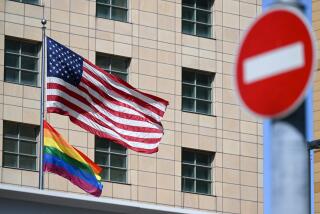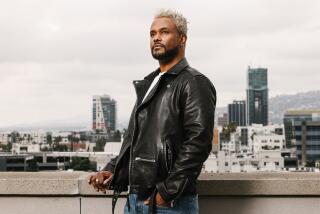Obama’s inaugural speech gives hope to gay marriage supporters
WASHINGTON — By equating the gay rights struggle with those of African Americans and women, President Obama in his inaugural address set a standard that boosted gay activists’ hopes that he soon would make a bold legal move to support a constitutional right to gay marriage.
Obama’s words themselves were a landmark — the first time gay rights had ever been advocated in the high-profile speech. But the president, speaking just feet from Supreme Court justices who will take up the issue of gay marriage this spring, went far beyond a simple mention. He equated gay rights with the country’s iconic civil rights movements.
“We, the people, declare today that the most evident of truths — that all of us are created equal — is the star that guides us still; just as it guided our forebears through Seneca Falls, and Selma, and Stonewall,” he said, linking the beginning of the women’s suffrage movement, the battle for black rights in the South and the gay protest against police harassment in New York as equal steps in the nation’s march toward equality.
PHOTOS: Obama’s second inauguration
“Our journey is not complete until our gay brothers and sisters are treated like anyone else under the law,” he continued, “for if we are truly created equal, then surely the love we commit to one another must be equal as well.”
The passage “was definitely one of those moments that took your breath away,” said Adam DeRosa, president of the Lesbian and Gay Band Assn., whose 215 members later marched past the president in the inaugural parade. “We understand the historical significance of it. What political significance it has remains to be seen.”
Obama, who only last spring hesitated to declare his public support for gay marriage, soon will have to decide whether his administration will take the potentially huge step of arguing before the Supreme Court that gay marriage is an equal right under the Constitution.
The court will soon review two cases, one of them involving California’s Proposition 8, the ballot measure that limited marriage to unions between a man and a woman. Gay rights lawyers have asked the Supreme Court to declare the ballot measure unconstitutional, potentially striking down the laws of 41 states.
To several legal scholars, Obama’s equating of Selma and Stonewall strongly implied he is prepared to side with gay rights activists. But doing so would mark a sudden departure from the caution with which he has typically approached most issues.
PHOTOS: Barack and Michelle’s inaugural dance
Asked whether the speech was intended to send a signal about the Supreme Court case, a White House official, speaking on condition of anonymity to discuss internal deliberations, said, “It’s a legitimate question, but for today, we’re letting the president’s speech stand on its own.”
Theodore Olson, the former George W. Bush administration solicitor general and lawyer for the gay couples challenging Proposition 8, said the president sounded ready to back a constitutional right to gay marriage.
“I was very gratified to hear the president state in clear and unambiguous language that our gay and lesbian citizens must be treated equally under the law,” Olson said, “and that their loving relationships must be treated equally as well. That can only mean one thing: equality under the Constitution.”
Evan Wolfson, president and founder of New York-based Freedom to Marry, noted in an interview that Obama’s speech “was an inaugural address, not a legal brief, and we will see over the next several weeks exactly what positions the Justice Department takes.”
PHOTOS: Obama’s second inauguration
“I am confident the president knows that the Constitution requires equality in the freedom to marry,” he added.
The excitement that Obama’s remarks spurred among advocates of gay marriage was matched by dismay among its opponents. Byron Babione, senior counsel at Alliance Defending Freedom, which is co-counsel in the Proposition 8 case now before the Supreme Court, said it was “deeply dishonest to equate the civil rights movement to today’s homosexual activism.”
“Civil rights marchers were met with batons, fire hoses, tear gas and nooses. So-called pride parades are met with Fortune 500 corporate sponsorship,” he said. “African Americans were systematically dehumanized, while homosexual activists are lionized by every powerful cultural institution and center of wealth in America.”
For most of his political career, Obama has supported gay rights but said he opposed same-sex marriage. In May, the president announced that he had “evolved” on the issue and that he now personally supported gay marriage. But he also said the matter should be decided on a state-by-state basis.
Public opinion on the matter has shifted starkly in recent years. An NBC News/Wall Street Journal Poll conducted Dec. 6-9 found that 51% favored or strongly favored gay marriage, with 40% opposed. In 2004, the same poll found 30% in favor and 61% against.
“The country has shifted,” said Dawn Moretz, 45, an elementary school teacher in Marshville, N.C., who was walking with a friend on the edge of the inaugural parade route Monday. Gay rights is “still a hot-button issue, but it’s not as hush-hush as it used to be,” she said.
The inaugural ceremonies reflected that shift. In addition to the lesbian and gay band that marched in the parade, officials chose a gay poet, Richard Blanco, to read at the celebration.
Such symbolism, however, would pale in comparison with a Supreme Court declaration. The justices have agreed to hear the two gay marriage cases in late March. Both pose questions about equal rights for same-sex couples.
In one case from New York, the justices will decide whether legally married gay couples are entitled to equal benefits under federal law. Obama’s lawyers have joined with gay rights advocates in the case.
The other case stems from Proposition 8. U.S. District Judge Vaughn Walker overturned Proposition 8 in 2010, ruling that it violated both the due process and equal protection clauses of the Constitution. An appeals court affirmed the decision, and the Supreme Court decided in December to take the case.
So far, the Obama administration has not weighed in on the question. And because it is a state case, the Justice Department could stand aside and not take part. The administration has until late February to decide whether to file a brief in the case. Lawyers close to the administration say the final decision will be made at the White House, not the Justice Department.
Jessica Garrison in Los Angeles and Brian Bennett in Washington contributed to this report.
More to Read
Start your day right
Sign up for Essential California for news, features and recommendations from the L.A. Times and beyond in your inbox six days a week.
You may occasionally receive promotional content from the Los Angeles Times.








